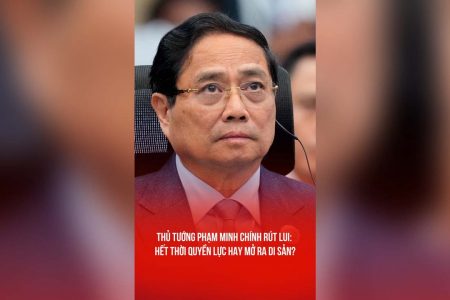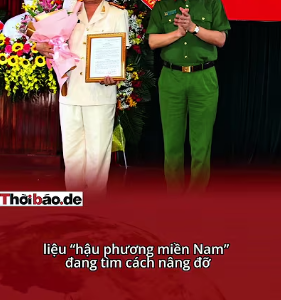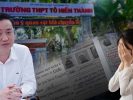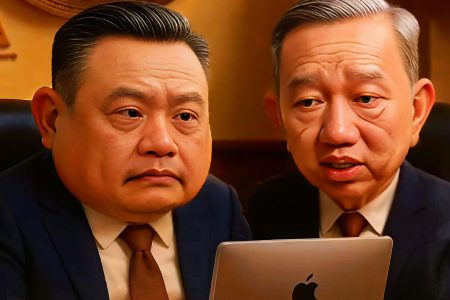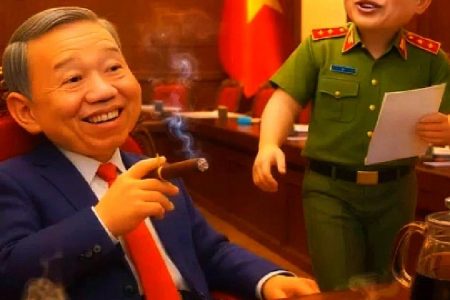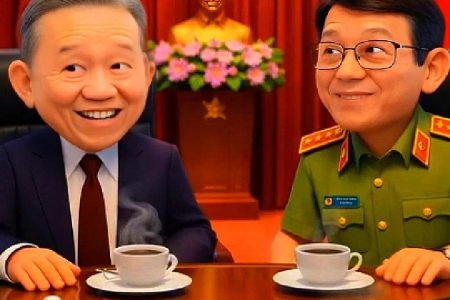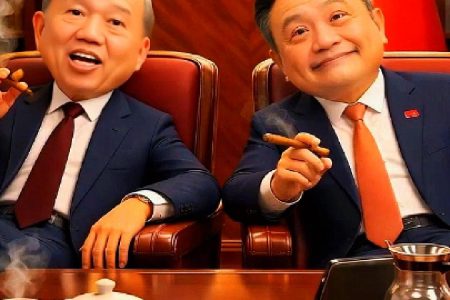Former Harvard Law professor, Professor Ta Van Tai, said that Vietnam is still avoiding the mention of Prime Minister Pham Van Dong’s diplomatic note in 1958, a document that he thinks has caused Hanoi to „put its foot in its mouth“ in China’s struggle with sovereignty over the East Sea (South China Sea).
According to him, Vietnam should confront China more directly and „hard,“ not to let this note „make it difficult“ for the regime in Hanoi.

Explaining the above statement, GS. Ta Van Tai said that in Vietnam’s recent response to a series of actions aimed at asserting China’s sovereignty, Vietnam still showed an attitude of „avoiding“ and only mentioned the issue of „diplomatic note“ after China took the initiative to invoke this note earlier.
“It has an aspect that I call ‚gaping mouth,‘ which according to International Law is called ‚Estopel‘ (the principle of non-denial), that is, the principle of a given country cannot be said to be the opposite,” Prof. Tai told VOA.
Why does Vietnam „dodge“ the mention of Pham Van Dong’s diplomatic note?
A note issued in 1958 by then PM Dong of the Democratic Republic of Vietnam to Premier Zhou Enlai of the People’s Republic of China, in which Dong „acknowledges and approves“ the declaration on September 4, 1958 of the Government of the People’s Republic of China „decided on China’s 12 nautical miles territorial waters.“
China’s September 4, 1958 statement stated, “The territorial breadth of the People’s Republic of China is 12 nautical miles. This regulation applies to the whole territory of the People’s Republic of China, including the Chinese land on the mainland and offshore islands, Taiwan (separated from the mainland and other islands by the sea) and adjacent islands, Banh Ho archipelago, Dong Sa archipelago, Xisha archipelago, Trung Sa archipelago, Nansha archipelago, and other islands belonging to China.”
Although Vietnam believes that the note did not mention Hoang Sa (Xisha) and Truong Sa (Nansha), but with „acknowledging and approving“ China’s statement in Dong’s note, in recent years, Hanoi has always been in an „embarrassing“ situation when Beijing mentioned the note that many people called „the act of selling the country.“
“Because in that note, Mr. Pham Van Dong’s words were vague, acknowledging the things in Zhou Enlai’s note. So it can explain the ambivalent, harmful to Vietnam or beneficial to Vietnam,” Prof. Tai explained.
Former Harvard law expert said China always „dangles“ Pham Van Dong’s note like a noose on the neck of Vietnamese people, making the Vietnamese government very „afraid“ to mention this document.
According to VOA’s researches, over the past years, Vietnam has sent several notes to the United Nations to refute China for Pham Van Dong’s note. However, these actions are not as widely known to the public nor to the international public opinion. Prof. Tai said that in addition to the reasons explained above, Hanoi may also feel „ashamed“ if the note was exposed to the public.
Besides, according to him, Vietnam was „embarrassed“ before China because of some other cases.

“Another embarrassing thing was that textbook at that time of Vietnam printed in “Hoang Sa – Truong Sa (China).” The ship said Hoang Sa and Truong Sa were among the pearls of China’s islands, so Vietnam in the 9th-grade textbook also repeated that sentence of China. Vietnam’s maps were designed by the Chinese who came to work as an advisor to the Cartography Department of Vietnam. On the map, it says ‘Hoang Sa (China)’, below it says ‘Truong Sa (China)’, and the Vietnam Map Department also listens to it. The doting itself turned out to be like a gaping mouth,” Prof. Tai said.
According to him, instead of avoiding, Vietnam should deal directly with China on the issue of diplomatic notes and „neutralize“ it with solid arguments.
„There are two arguments that Vietnam can use,“ Prof. Tai said.
“Firstly, the 1954 Geneva Agreement divided the country into two, and it granted the administrative management of Hoang Sa and Truong Sa to the south of the 17th parallel to the government of the Republic of Vietnam. All countries, including China, have recognized the sovereignty of Hoang Sa and Truong Sa as belonging to the Republic of Vietnam.”
“This government, as well as its navy, has strongly asserted sovereignty over the islands during China’s invasion of Paracels in 1974. According to international law, when a nation uses force to resist its aggression other means that have claimed the country’s sovereignty ”.
Thus, according to the explanation of Tai, Mr. Pham Van Dong at that time only represented the government of North Vietnam, so „no authority“ to talk about sovereignty over Hoang Sa and Truong Sa.
„From 1974 to 1975, the Socialist Republic of Vietnam is the successor state in the conduct of protecting that sovereignty of the two archipelagos,“ Tai added.
According to him, this recognition is also reflected by then Prime Minister Nguyen Tan Dung in a speech to the National Assembly in 2011. At this meeting, Mr. Nguyen Tan Dung said, „In 1974, China used force to seize the whole the Hoang Sa archipelago during the then administration of Saigon government. The Saigon government had protested, condemned the practice, and asked the United Nations to intervene.“
In addition, according to Prof. Tai, the existence of the „two countries“ situation in Vietnam at that time was also confirmed by the definition of the Montevideo Convention, with 4 conditions: a stable population and a defined territory, the authority and the ability to enter into international relations.
The second argument, according to him, the official note of PM Dong is just a unilateral declaration, cannot be considered as a land and territorial cession.
According to him, the time when PM Dong was sent to the diplomatic note was when the Northern authorities were receiving great help from China, so the note was only political-diplomatic, frankly said „flattering“ China, only.
“Pham Van Dong is the prime minister (so) he has no right.”
According to the 1946 Constitution, the assignment of land to foreign countries is only authorized by the President, and must be approved by the National Assembly. Without those procedures, there is no problem of land transfer,” Prof. Tai further explained.
According to Tai, Vietnam should have a voice „stronger“ and „public“ its arguments on the notes as well as issues of territorial sovereignty in major international forums such as the United Nations and other places.
In addition, the „strong voice“ must also come from the heads of state, not just those who do diplomatic affairs of Vietnam.
Prof. Tai said: „It must be said to be stronger. And now the big level did not dare to say. The Prime Minister did not dare to say, only the wrong people said. Even Minister Pham Binh Minh when he came to the United Nations when China was torturing Vietnam, said only ‘there are instability issues in the South China Sea’ and did not mention the Chinese name.”
According to Prof. Tai, showing the determination to „fight to the end“ is also essential in the fight with China. For example, the US and the Soviet Union during the Cold War, both showed the enemy the posture of „bullets were loaded“ on their side, Prof. Tai said that in the South China Sea issue, Vietnam must also show China the „decisive“ attitude if necessary to protect its sovereignty.
China will go further if Vietnam tries to use soft words. If Hanoi stays firm and voices loudly against Beijing’s violations, China may step back, Tai said.
According to Tai, compared with other countries in the region, Vietnam has a very important position in the strategy of the US and other countries. Therefore, it is time for Vietnam to end its „fear“ of China and speak out strongly for its rights.
Vietnam has drawn a clear awareness of who is “friend,” “close friend,” and who “came to us” in difficult times, who is just “partner” through what we have witnessed about security. In the South China Sea, during the Covid-19 pandemic, Vietnam’s Deputy Defense Minister Lieutenant General Nguyen Chi Vinh told the country’s defense and military media.
Vinh said it was necessary to “condemn” the countries that took advantage of the Covid-19 pandemic to promote what he called “illegal ambition.”
In a speech on April 26, 2020, on the Vietnam National Defense Channel, under the Central Military Commission and Ministry of Defense, Lieutenant General Nguyen Chi Vinh said: “Challenges in regional security exists with or without the pandemic, it is a challenge, but it is not yet a risk.”
“It is condemning that the countries on this occasion promote their illegal activities and ambitions and that I think is not in their favor. The country does so will not get benefits. „
“In the meantime, we never forget other tasks to deal with security challenges, such as protecting the sovereignty we cannot forget, cannot neglect. Our navy ships, our coast guards don’t have a day off. „
„Soldiers in Truong Sa are doing their efforts to prevent the Covid-19 infection while staying cautious to protect the archipelago.”
Regarding foreign and international relations through security developments in the South China Sea during the Covid-19 pandemic, Gen. Vinh, who is a member of the Central Committee of the Communist Party of Vietnam and a standing member of the Central Military Commission, said:
“At times like these we will know who are you, who are best friends, who are just partners. At times like these, we realize that when our country is in trouble, those who will come to us.
„So this is very important and I think the most important lesson is to properly forecast the situation and make up your mind early.“
Facing more and more dangerous developments in the South China Sea caused by China, especially recently, when the authorities in Beijing announced to the world and sent a Note to the UN to affirm the Spratlys and the Paracels belonging to their sovereignty and asked the Vietnamese People’s Army to immediately withdraw from the islands and rigs. This is almost a declaration of war.
Vietnam needs to prepare for every situation that will happen in the future.
Thu Thuy from Hochiminh city – Thoibao.de (Translated)



